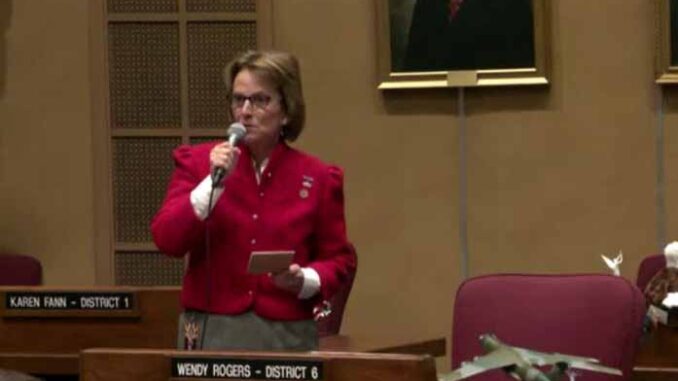
Questions have been raised about the efforts undertaken by Sen. Wendy Rogers to influence legislation during last year’s session related to criminal harassment, and the role her personal attorney may have played in trying to persuade a state lawmaker to weaken the language in a bill in a way that might have benefitted Rogers personally.
But getting answers won’t come easy, because the beleaguered senator has not consented to the release of the public records which could answer those questions.
Going into last year’s session, state prosecutors complained their hands were often tied when it came to prosecuting someone who committed harassment by doxing, as the activity was not specifically defined in Arizona Revised Statutes. Doxing is the release of someone’s personal identifying information such as home address, work address, phone number, and email address.
As a result, Rep. Shawnna Bolick (R-LD20) introduced House Bill 2502 to expand the definition of harassment to include doxing activities. It would add harassment by doxing to three other Class 1 harassment misdemeanors covered under ARS 13-2916, which can be prosecuted in either the jurisdiction where an offending communication originated or where it is received.
As introduced, Bolick’s bill made it illegal to use an electronic communication to distribute a person’s personal identifying information -including a digital image- which allows the identified person or that person’s immediate family to be located or contacted by a third party for the purpose of causing “imminent injury or harassment.”
Bolick later amended her bill, so that the use of an electronic communication must incite or produce unwanted physical contact, injury, or harassment, not just the possibility of harassment.
HB2502 cleared the House on Feb. 25, 2021 with a bipartisan vote of 48-11-1. But by mid-March the bill stalled in the Senate despite easily clearing the Judiciary and the Rules committees.
Then on or before April 1, 2021, Rogers (R-LD6) sent or caused to be sent an email to Bolick which included “suggested amendment language” to HB2502. The suggested language appears to have been provided by an attorney named Mr. Walsh who had “concerns” with the legislation, according to public records released earlier this month with Bolick’s consent.
At the time of the email, Rogers was the defendant in a defamation lawsuit under consideration by the Arizona Supreme Court. Her attorney in that case was E. Jeffrey Walsh of Greenburg Traurig.
Bolick responded to Rogers via email on April 1, 2021, rejecting the proposed amendment language which would have limited the circumstances under which harassment by doxing could be prosecuted. But the public does not know exactly what language Roger or her attorney proposed or why, because the senator has ignored requests to authorize the release of her email and any attachment.
It is known that a few weeks later Rogers proposed a floor amendment which gutted out a significant provision of Bolick’s bill related to electronic communication “of a harassing nature.”
HB2502 as amended by Rogers eventually passed and was signed by Gov. Doug Ducey on April 28, 2021. It went into effect 90 days after the session ended, leaving prosecutors with far fewer options than hoped for in dealing with communications intended to support harassment of others.
But several state lawmakers have told Arizona Daily Independent they did not know at the time, of Rogers’ failed attempt to secure Bolick’s support for the earlier amendment. Nor were they aware of the involvement of Rogers’ private attorney to facilitate changes to the legislation, at the same time as she was being sued for allegedly doxing a pro-family modeling agency and its owner.
Some answers to Rogers’ purpose for the change to HB2502 will likely be found in her email to Bolick. But the record cannot be released without the senator’s consent, according to Justin Riches, Public Records Counsel for the Arizona Legislature.
Arizona Daily Independent has made two such requests of the senator without any response.
